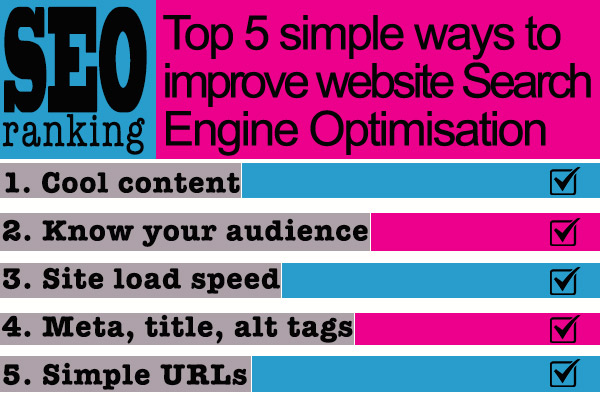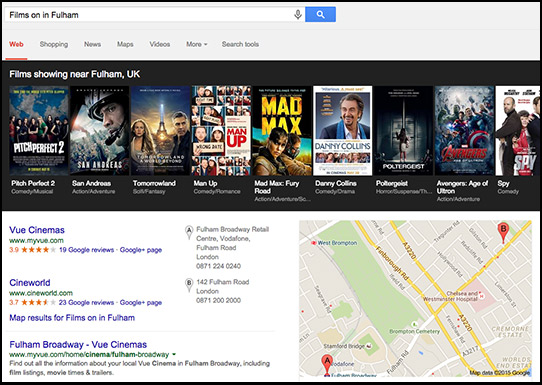What is SEO?
According to Google, Search Engine Optimisation (SEO) is the process of affecting the visibility and performance of a website or a web page in a search engine’s unpaid results. These results are usually referred to as organic search results which means that results are generally derived from relevance to the search terms, as opposed to simply being paid for advertisements.
Over the years Google in particular has become a very valuable resource for businesses to gain work. The term ‘Google it’ has made it into the Oxford English dictionary and it is one of the main ways web users find and refine what they are searching for online.
There are many Google ranking algorithms which are put in place as systems to help Google search determine the placement of a web page in search results. These can be released at any time, meaning that your site ranking can alter dramatically depending on the algorithm and the time of release.
Many companies are often searching for ways to improve and understand their Search Engine Optimisation. There are various factors which can help your website’s SEO and companies are beginning to invest much more of their time and budget into growing their ranking. It is vitally important that you don’t overlook the basics of SEO as they are the foundation to building an effective online presence.
5 quick ways to improve your websites SEO
- Cool Content Creating interesting content is one of the simplest yet most effective ways to market your company. If your content is regularly updated then there is a better chance that you will engage with potential clients and encourage them to revisit your website. Regularly viewed content is one of the major components of SEO, however it is extremely important to consider quality over quantity when writing blogs and news items.
- Write for your audience not your search engine
It is extremely difficult to write specifically for SEO. It becomes extremely contrived when you are trying to use key search terms and keywords all the way throughout a piece. It becomes impossible to read and although external links and keywords should be included, there is definitely a code of best practice for this. Ensure that your content is well-researched, thought provoking and tailored to your audience. Use SEO keywords organically and create a piece that you enjoy reading yourself. If your audience reads and shares, then you are likely to go up in search engine rankings. - Check your sites loading speed
Google offer a free tool where you can check your website page load speed. Your site’s load speed is an extremely important factor, especially if you are an ecommerce company relying on web sales. Research shows that 47% of consumers expect a page load time of 2 seconds or less, meaning that a slow page speed could very quickly lose you business. Since 21st of April this page speed was also taken into account with Google’s mobile-friendly responsive algorithm that was released. You can improve your page speed by updating your web host or by simply ensuring all of your content is optimised for web. - Meta, Title & Alt tags
You may need to speak to your web developer about meta tags, but they are basically the keywords added to the head section of your HTML page. Google says that meta tags are a great way for webmasters to provide search engines with information about their sites. This is a very simple way to increase your SEO. The same goes for title tags. Title tags are the page’s title and should be on each and every page of your site. They should be optimised with key words and should be made up of 60 characters or less. Alt tags are a text version of an image or object on your web page. They are used so that search engines can crawl your content and understand what those non-text files are. Every image you upload to your site should be named properly and include a relevant alt tag. - Short and sweet URL’s
Make it as easy as possible for search engine robots to find and read your webpage URLs. This point should be considered every single page of your website. It is a simple way to ensure that search engines associate your page with the correct business and keywords. The page URL should be succinct, self explanatory and any underscores (_) or unusual characters should be replaced with a dash (-).

Google Search Console
Google Search Console (also known as Webmaster Tools – rebrand as of May 20th 2015) is a free service provided by Google that allows users to diagnose and improve the visibility of their website content in Google searches. It allows website owners to check their indexing status and optimise their websites visibility.
How can Google Search Console help you:
- Inform you of queries which caused your site to appear in search results
- Inform you of which queries resulted in more traffic
- Inform you of which sites are linking to your website
- Inform you the site is performing in Mobile searches
How to optimise your site for Google Search Console
- Make sure that Google can access your content
- Submit new content for crawling and remove content you don’t want shown in search results
- Create and monitor content that delivers visually engaging search results
- Maintain your site with minimal disruption to search performance
- Monitor and resolve spam issues quickly
Structured Data in SEO
At one stage when you typed a term in a search engine you would be presented with a list of blue links to related websites. Nowadays the function and display of search engines has evolved so dramatically that now each search result is detailed with images, maps and other data that can offer everything you need without any need to click away form the search page.

Results include: film posters, addresses, Google maps and more.
Google is shifting further towards these ‘blended’ search results, which means that whilst keywords and other contributing factors to SEO still remain important, the way that search engine results are found and presented is advancing and becoming more intuitive and focused on individual user experience. In 2012 Google launched The Google Knowledge Graph which is a system that assists Google in displaying real-time results and answers rather than just lists of information. Since then, the way that Google searches for and displays data has dramatically altered and is set to rely further on structured data within websites to further enhance the user experience.
Both Bing and Google Search Console use structured data and have tools to help you implement it. Structured data essentially enables search engines to gain a better understanding of the information on your webpage and uses this information to improve your SEO ranking.
The Google Zoo of Algorithms
Google Algorithms are used by Google search in order to distinguish where each page will display in relation to each search. These algorithms are released as Google search updates and are based on a variety of different search criteria.

Penguin Algorithm
Google launched the Penguin algorithm to decrease the ranking of websites who ‘cheated’ in order to jump up the rankings. This included people who were buying links and generally spamming in order to get ahead.
Panda Algorithm
The Panda update was basically released in order to stop websites from replicating material that they found on other websites just to jump up the rankings. Later updates also included dropped rankings fro those who duplicating information from their own site. This has meant that content is forced to be unique and it was becoming less possible to ‘trick’ Google into think you had exciting new content.
Hummingbird
The Hummingbird algorithm was released to help Google recognise language and longer phrases more directly rather than only recognising key words. This has meant that Google search has become much more intuitive and is beginning to develop a deeper understand of users requirements and therefore deliver a better overall user experience.
One of the latest algorithm updates was the ‘Responsive, mobile-friendly‘ update released on April 21st 2015. This forced many website owners to update their websites in order for them to work responsively across all devices and browsers. This is not only a great contributor to SEO ranking but it is also an extremely important part of web usability and user experience.
Conclusion
In conclusion to this, it is important to note that SEO rankings are constantly in a state of flux. There isn’t a way to stay at a constant ranking, so it is important that you update your site content regularly and engage in the evolving technologies and algorithms that with have an effect on SEO.
Reactive Graphics can offer a detailed SEO plan as part of our web design and development services and for more information about our work please get in touch.


